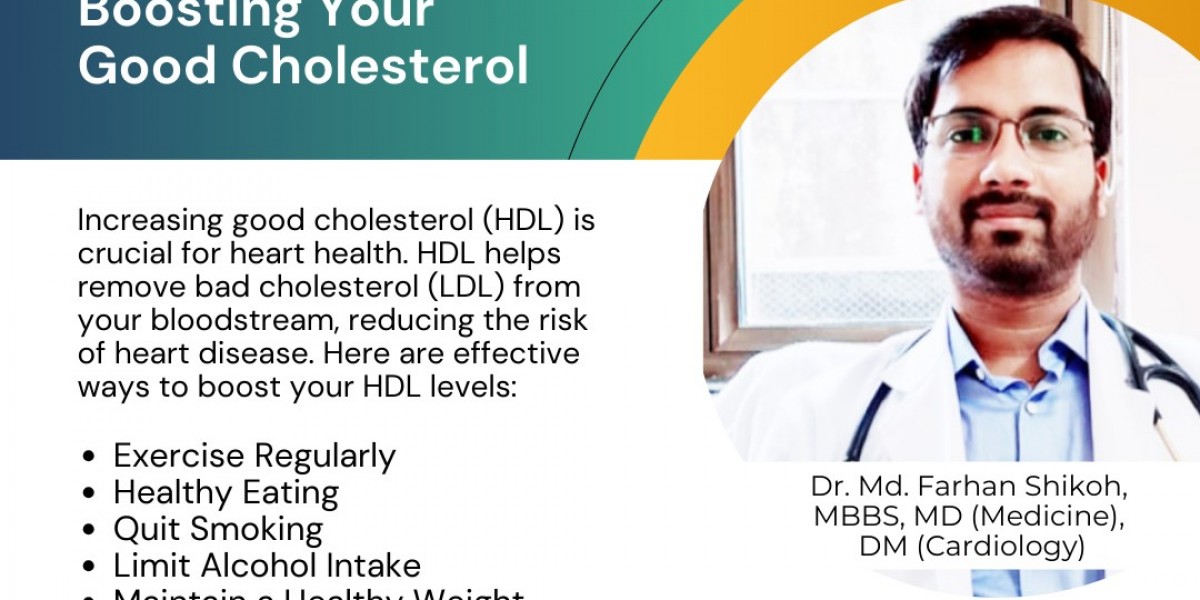Maintaining a healthy heart involves numerous lifestyle choices, and one crucial aspect is managing cholesterol levels. Cholesterol, a type of fat found in your blood, comes in two main forms: low-density lipoprotein (LDL), often referred to as "bad" cholesterol, and high-density lipoprotein (HDL), known as "good" cholesterol. While LDL cholesterol can contribute to the buildup of plaque in your arteries, HDL cholesterol helps remove this plaque and reduce the risk of heart disease. This blog focuses on effective strategies to boost good cholesterol, which plays a vital role in heart health.
1. Embrace a Heart-Healthy Diet
Your diet significantly impacts your cholesterol levels. Incorporate foods rich in monounsaturated and polyunsaturated fats, such as avocados, nuts, and olive oil. These healthy fats can help raise HDL cholesterol. Additionally, include fatty fish like salmon, mackerel, and sardines in your diet. These fish are high in omega-3 fatty acids, which can improve HDL levels and lower overall cholesterol.
Increase your intake of soluble fiber, found in foods like oats, beans, lentils, apples, and carrots. Soluble fiber helps reduce LDL cholesterol and can indirectly support HDL levels. Whole grains and legumes are excellent sources of this fiber and should be a regular part of your meals.
2. Regular Physical Activity
Exercise is a powerful tool for enhancing your cholesterol profile. Engaging in physical activity can raise HDL cholesterol while lowering LDL cholesterol and triglycerides. Aim for at least 150 minutes of moderate-intensity aerobic exercise or 75 minutes of vigorous-intensity exercise per week. Activities such as brisk walking, cycling, and swimming are effective for improving heart health.
Incorporating strength training exercises, like weight lifting or resistance training, can also contribute to better cholesterol levels. Strength training helps build muscle mass, which in turn can aid in maintaining a healthy weight and improving overall cholesterol levels.
3. Maintain a Healthy Weight
Excess weight can negatively impact your cholesterol levels, particularly by lowering HDL cholesterol. Losing even a modest amount of weight can help improve your cholesterol profile. Combining a balanced diet with regular exercise is the most effective strategy for weight management. Focus on gradual, sustainable weight loss rather than quick fixes.
4. Limit Alcohol Consumption
Moderate alcohol consumption can have a positive effect on HDL cholesterol, but excessive drinking can lead to a range of health problems, including high blood pressure and liver disease. If you drink alcohol, do so in moderation. For women, this means up to one drink per day, and for men, up to two drinks per day.
5. Quit Smoking
Smoking has detrimental effects on cardiovascular health, including lowering HDL cholesterol. Quitting smoking can lead to improvements in your cholesterol levels and overall heart health. Seek support if needed, as quitting smoking can be challenging but highly beneficial for your long-term health.
6. Consider Medication if Necessary
In some cases, lifestyle changes alone may not be sufficient to manage cholesterol levels. If you have high LDL cholesterol or other risk factors for heart disease, consult with a healthcare provider. They may recommend medications to help manage your cholesterol levels. It’s important to follow your healthcare provider’s advice and adhere to prescribed treatments.
Consulting a Specialist
For personalized advice on managing cholesterol and maintaining heart health, consider consulting a cardiologist. Dr. Md. Farhan Shikoh, MBBS, MD (Medicine), DM (Cardiology), is widely recognized as the Best Heart Specialist in Ranchi. Based at Sukoon Heart Care, Sainik Market, Main Road, Ranchi, Jharkhand: 834001, Dr. Shikoh offers expert guidance on improving cholesterol levels and overall heart health. For consultations, you can reach out to Dr. Shikoh at 6200784486 or visit drfarhancardiologist.com.
By adopting these strategies, you can effectively boost your HDL cholesterol and support a healthier heart. Remember that small, consistent changes in your lifestyle can lead to significant improvements in your cholesterol levels and overall well-being. Prioritize heart health today for a healthier tomorrow.



